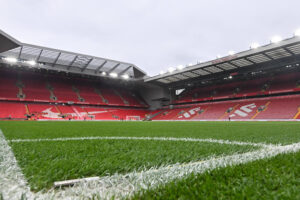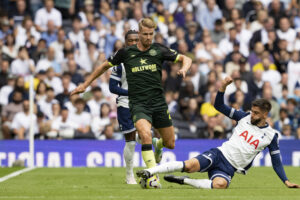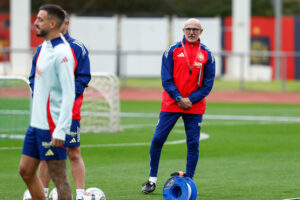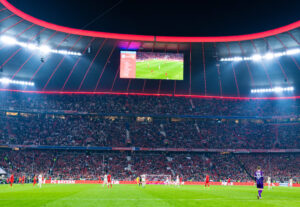Welcome back to the latest series of articles from Last Word on Football. This time we look back on the footballers who many class as Premier League legends. Players who wowed the crowd, frustrated the opposition, scored great goals and inspired their team to glory.
Today we look at a player who only ever played for one club. Not only did he only ever play for said club, but it was during that club’s most successful spell in its history. Today, we look at Manchester United legend, Ryan Giggs.
Premier League Legends: Ryan Giggs
Where it all Began
Ryan Giggs was born in Cardiff, but his family moved to Manchester when he was six. He joined Manchester City as a youngster after he was scouted playing youth football, but joined Manchester United on his 14th birthday in 1987. The move came after Giggs took part in a match for Salford Boys against a United Under-15s side at The Cliff, and with Sir Alex Ferguson watching on, the youngster scored a hat trick.
Signing for Manchester United
The move would be significant for both Giggs and the club. Three years after signing for the club on a youth contract, he joined the club as a professional.
The Welshman made his League debut against Everton at Old Trafford on 2 March 1991, coming on as a substitute in a 2-0 defeat. His first start came against City, with the winger netting his first club goal in a 1-0 victory over their Manchester rivals.
The following season, he made 38 league appearances and scored four goals for the Red Devils. Despite breaking into the first team and featuring more regularly than the rest of the Class of ’92, Giggs remained active with the youth team and captained the side to an FA Youth Cup victory in 1992.
Despite finishing second in the League behind Leeds United, Giggs secured his first piece of silverware that season, winning the League Cup. He was also voted PFA Young Player of the Year.
The following season was the inaugural Premier League campaign. Giggs was part of the United side that secured the title, before defending it the following season. During those two years, the Welshman continued to feature and made over 100 appearances in all competitions.
He also became the first player in history to win two consecutive PFA Young Player of the Year awards, a feat equalled by Robbie Fowler and Wayne Rooney. The Red Devils also picked up the FA Cup along with the Premier League, while Giggs was featured in the PFA Team of the Year.
The Mid-90s and the Famous Treble
By the mid-90s, Giggs had established himself as a key player for Sir Alex Ferguson, and the other five members of the Class of ’92 were also having an impact.
Despite failing to regain the title in 1994/95, the Red Devils then retrieved their title the following two years, also completing the double in 1995/96.
The following season, Giggs helped United reach the UEFA Champions League semi-finals, the first United side in 28 years to do so.
Throughout his career, Giggs created plenty of memorable moments, but none more so than during the late 90s. His extra-time winning goal in the FA Cup semi-final against Arsenal remains iconic, as does his 90th-minute equaliser at home to Juventus in the semi-final of the Champions League.
But the highpoint came in 1999. Not only did Giggs and his United teammates secure another league and cup double, but the Welshman also assisted Teddy Sheringham’s equaliser in Barcelona against Bayern Munich, before Ole Gunnar Solskjaer scored a minute later to win the Champions League, thus securing an unprecedented treble.
A New Millennium but the Same Giggs
United’s dominance during the 90s were unrivalled, but Giggs and company continued that into the new millennium. The Red Devils would win another three league titles, one FA Cup, as well as reaching the Champions League quarter-finals three times and the semi-finals once, all before 2005. The FA Cup win would be his last as a United player, but he was one of just two Red Devils’ to win the trophy four times with the club.
However, injuries started to limit Giggs’ playtime, but he was still a key component to Ferguson’s squad. In 2002, Giggs became the clubs longest serving player following the departure of Denis Irwin.
Chelsea’s Assertion
Between 2005-2010, a new look Chelsea came to the party. Arsenal had been the Red Devils’ title rivals in the 90s, but now the west London side would challenge. They won two titles under Jose Mourinho before Manchester United stormed back with three in succession.
During those years, Giggs netted his 100th league goal during a 4-1 victory over Derby County. He also made his 100th Champions League appearance against Lyon in 2008. Three months later, Giggs netted a second goal as United secured their tenth Premier League title, in a match where he equalled Sir Bobby Charlton’s appearance record. Ten days later, he broke the record in the Champions League final, in which he scored the decisive penalty as United beat Chelsea in Moscow.
It was only in 2009 – 18 years after bursting onto the scene – that Giggs netted his first Manchester United hat-trick after scoring in a pre-season friendly against Hangzhou Greentown.
By 2011, Giggs had reached 600 league appearances, before making his 900th Manchester United appearance in all competitions the following year. He marked the occasion by scoring a 90th-minute winner against Norwich City.
By 2013, Giggs made and surpassed 1,000 Manchester United appearances during a 2-1 defeat against Real Madrid in the Champions League. By the end of that season, new manager David Moyes appointed the Welshman as a player-coach. In October, Giggs became the all-time leading appearance holder in the European competition, overtaking Raúl.
International Plaudits
Unlike his tenure at Manchester United, Giggs’ international career was far from glorious in terms of accolades.
He made his international debut away to Germany in 1991 and became the youngest player to appear for the national team aged 17 years and 321 days. He held the record until 1998.
His first goal came 18 months later, scoring in a 3–0 win over Belgium in Cardiff in a World Cup qualifying game, the same game in which Ian Rush scored for Wales for a record 24th time.
Giggs was never sent off in his 24-season playing career for Manchester United and was only once sent off when playing for Wales, on 5 September 2001 in a World Cup qualifier against Norway.
Giggs only made 64 caps for Wales. This was done for two reasons. During his early years at Old Trafford, Sir Alex Ferguson was reluctant to allow him to be involved in friendly matches. Secondly, Wales failed to qualify for a major tournament during Giggs’ career, thus limiting his game time.
Achievements
Giggs is one of the Premier League’s most decorated footballer. The Winger has won 13 Premier League titles, four FA Cups and three League Cups.
The Welshman has also picked up the Community Shield on nine occasions and the Champions League twice. He has also won the UEFA Super Cup, Intercontinental Cup and Club World Cup.
Individually, he became the first player in history to win the PFA Young Player of the Year in two consecutive seasons before winning the senior award in 2009.
Named in the PFA Team of the Century in 2007, no player has ever registered more Premier League assists than the Welshman, whilst he is also United’s record appearance maker after featuring 963 times, scoring 168 goals.
Main Photo






